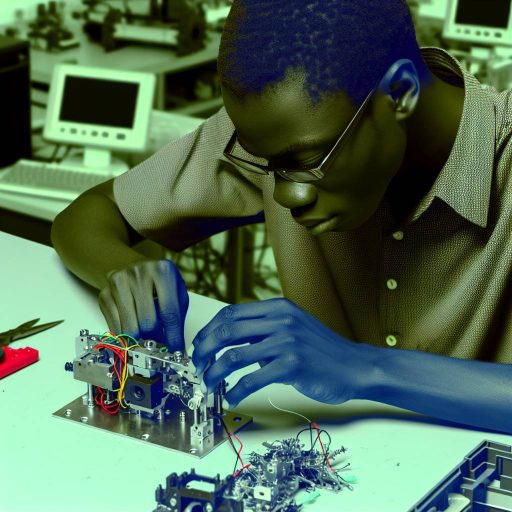Biomedical engineers play a crucial role in healthcare by designing, developing, and maintaining medical equipment.
They are essential in hospital settings to ensure that medical devices are safe and effective for patient care.
Training and Education
Requirements to become a biomedical engineer in Nigeria.
In order to become a biomedical engineer in Nigeria, individuals must possess at least a Bachelor's degree in biomedical engineering or a related field.
Additionally, further education such as a Master's degree or PhD may be beneficial for career advancement.
Accredited universities that offer biomedical engineering programs.
Several universities in Nigeria offer accredited biomedical engineering programs including the University of Lagos, Ahmadu Bello University, and Obafemi Awolowo University.
These programs provide students with the necessary knowledge and skills to excel in the field.
Specialized skills and knowledge needed for the job.
Biomedical engineers require a combination of technical, analytical, and problem-solving skills.
They must also have a strong understanding of biology, chemistry, physics, and mathematics in order to design and develop medical equipment and devices.
Additionally, excellent communication and teamwork skills are essential for collaborating with healthcare professionals to ensure the effectiveness of their products.
Biomedical Engineers in Nigerian Hospitals
Biomedical engineers in Nigerian hospitals play a crucial role in ensuring that medical equipment is well maintained and functioning properly.
Maintenance and Repair of Medical Equipment
One of the primary responsibilities of biomedical engineers is to maintain and repair medical equipment used in hospitals.
This includes preventive maintenance to ensure that equipment is in good working condition and repairs when equipment breaks down.
Biomedical engineers are trained to troubleshoot and fix a wide range of medical devices, from simple tools to complex machines.
Collaboration with Healthcare Professionals
Biomedical engineers work closely with healthcare professionals such as doctors, nurses, and technicians to understand their needs and provide technical support.
They collaborate in the design and development of medical devices, ensuring that the equipment meets the specific requirements of healthcare providers and patients.
By working together, biomedical engineers and healthcare professionals can improve patient care and outcomes.
Testing and Evaluation of New Medical Technologies
Another important responsibility of biomedical engineers is to test and evaluate new medical technologies before they are implemented in hospitals.
They conduct thorough analyses to ensure that the equipment is safe, reliable, and effective for patient care.
By testing new technologies, biomedical engineers can help healthcare providers make informed decisions about which equipment to use and how to integrate it into their practice.
Gain More Insights: Government Policies Affecting Mechatronics Field
Challenges Faced by Biomedical Engineers in Nigerian Hospitals
Biomedical engineers in Nigerian hospitals often struggle with inadequate resources and funding for their projects.
This lack of financial support can hinder their ability to purchase necessary equipment and technology.
Additionally, it affects their capacity to conduct research and development.
Another significant challenge for biomedical engineers in Nigerian hospitals is the shortage of trained professionals in the field.
This scarcity of skilled workers can lead to increased workloads and burnout.
Furthermore, it reduces efficiency in providing healthcare services.
In order to overcome these challenges, biomedical engineers in Nigerian hospitals must prioritize ongoing professional development.
This includes staying current with industry trends.
They should attend conferences and workshops.
Obtaining additional certifications can also enhance their skills and knowledge.
Addressing the challenges faced by biomedical engineers in Nigerian hospitals requires a multi-faceted approach.
It involves increasing funding, improving training programs, and promoting continuous learning and development within the field.
You Might Also Like: Top Mechatronics Engineering Firms in Nigeria
Impact on Patient Care
Biomedical engineers contribute to improved patient outcomes by innovating medical technologies.
They design and maintain medical equipment that directly affects patient diagnosis and treatment.
Ensuring the safety and efficiency of medical equipment is a top priority for biomedical engineers.
- One way biomedical engineers impact patient care is by developing advanced imaging systems.
- These systems allow for more accurate and timely diagnosis of medical conditions.
- Improved diagnostic tools lead to better treatment plans and ultimately improved patient outcomes.
Another vital role of biomedical engineers is in the development of medical devices.
Transform Your Career with Expert Guidance
Get personalized mentorship consulting that’s tailored to your unique path. Our expert advice is actionable and exclusive.
Get StartedThese devices, such as pacemakers and prosthetic limbs, directly impact patient quality of life.
Biomedical engineers work to ensure that these devices are safe, effective, and reliable for patients.
See Related Content: History of Architecture in Nigeria: Key Milestones

Collaboration with Other Healthcare Professionals
Working in a hospital setting as a biomedical engineer requires strong collaboration with other healthcare professionals.
- Importance of teamwork in hospital settings:
- Teamwork is crucial for delivering comprehensive and efficient healthcare services to patients.
- Biomedical engineers often work side by side with doctors, nurses, and administrators to ensure the proper functioning of medical equipment.
- Collaborative efforts help in diagnosing and treating patients accurately and timely.
- How biomedical engineers work with doctors, nurses, and administrators:
- Biomedical engineers assist doctors in selecting the right medical equipment for patient care.
- They collaborate with nurses to provide training on the proper use and maintenance of equipment.
- Biomedical engineers work closely with hospital administrators to plan and budget for new equipment purchases.
- Enhancing communication for better patient care:
- Effective communication among healthcare professionals ensures seamless coordination in patient care.
- Biomedical engineers play a key role in updating healthcare teams on equipment status and maintenance schedules.
- Improving communication channels leads to better patient outcomes and overall satisfaction.
Delve into the Subject: Innovations in Nigerian Materials Engineering Education
Future of Biomedical Engineering in Nigeria
Biomedical engineering in Nigeria is poised for significant growth and development in the coming years.
As advancements in technology continue to revolutionize the healthcare sector, the role of biomedical engineers will become increasingly important in ensuring the delivery of quality healthcare services.
Potential Growth Opportunities in the Healthcare Sector
One of the key areas of growth for biomedical engineering in Nigeria is in the development of medical devices and equipment.
With the increasing demand for healthcare services, there is a need for innovative solutions to improve patient care and outcomes.
Biomedical engineers can play a crucial role in designing and implementing technology that can enhance the diagnosis and treatment of various medical conditions.
Furthermore, the growing emphasis on preventive healthcare and wellness in Nigeria presents an opportunity for biomedical engineers to contribute to the design of devices and systems that promote healthy living.
This shift towards preventive healthcare is likely to drive the demand for biomedical engineering services in the country.
Advancements in Technology and How They Will Impact the Field
The rapid pace of technological advancements is transforming the field of biomedical engineering in Nigeria.
From wearable devices that monitor vital signs to artificial intelligence-driven diagnostic tools, technology is enabling biomedical engineers to develop innovative solutions that are more efficient and effective.
For example, the integration of telemedicine and remote monitoring technologies is revolutionizing healthcare delivery in Nigeria, especially in rural and underserved areas.
Biomedical engineers are at the forefront of developing and implementing these technologies to bridge the gap in access to quality healthcare services.
Importance of Investing in Biomedical Engineering for the Future of Healthcare in Nigeria
Investing in biomedical engineering is crucial for the future of healthcare in Nigeria.
By supporting the training and development of biomedical engineers, the country can enhance its healthcare infrastructure and capabilities.
This investment will not only improve patient outcomes but also boost the overall quality of healthcare services in Nigeria.
Furthermore, promoting research and innovation in biomedical engineering will drive economic growth and create opportunities for job creation in the healthcare sector.
By fostering a culture of innovation and entrepreneurship, Nigeria can position itself as a leader in biomedical engineering and healthcare technology in the region.
The future of biomedical engineering in Nigeria is promising, with vast opportunities for growth and development.
By leveraging advancements in technology and investing in the field, Nigeria can enhance its healthcare system and improve the well-being of its population.
Impact of Biomedical Engineers on Healthcare in Nigeria
Biomedical engineers play a crucial role in Nigerian hospitals by ensuring that medical equipment is functioning optimally.
Their work directly contributes to the improvement of healthcare delivery in the country.
This ultimately benefits patients and healthcare professionals.
It is essential to recognize and support the efforts of biomedical engineers in the healthcare system.
Such recognition can further enhance the quality of medical services.
Therefore, it is necessary to provide them with the necessary resources and training.
Acknowledgment of their valuable contributions is also important in the field.
By investing in and empowering these professionals, we can continue to advance the healthcare system in Nigeria.
This advancement can positively impact the lives of many.
Additional Resources
BME Overview | Nigerian Society for Biomedical & Clinical …
COVID-19, a blessing in disguise: the experience of a Nigerian …




